Harvey Mudd Welcomes New Faculty
July 18, 2017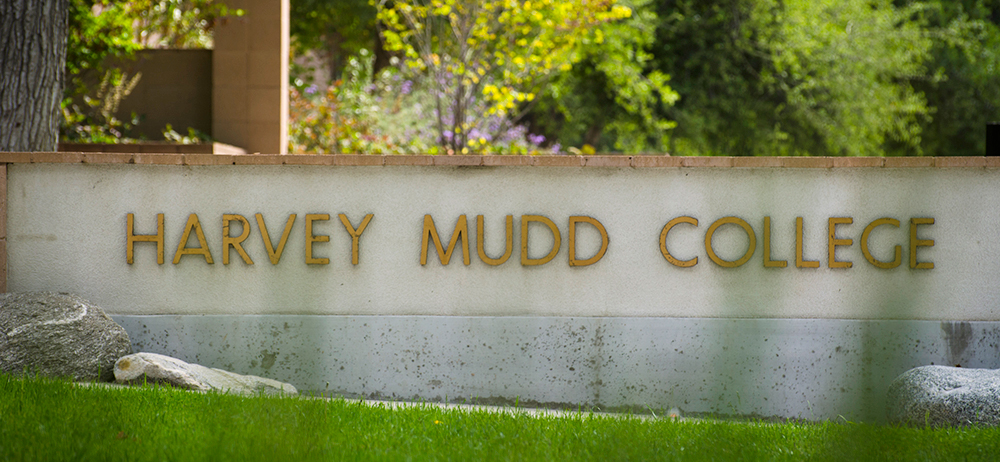
Motivated by the mission of broadly educating students in science, engineering, mathematics and in the humanities, social sciences and the arts, the faculty at Harvey Mudd College develops innovative pedagogies, offers opportunities for student research, engages students in experiential learning and challenges students to develop an informed world view that will help them become responsible citizens. Seven new teacher scholars, whose tenure-track appointments are effective July 1, will seek to carry on the academic excellence that has made the College one of the nation’s top STEM schools.
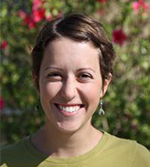 Katherine Breeden joins the Computer Science Department after finishing her PhD in computer science at Stanford, where she has served as a graduate research assistant and a teaching consultant. She earned her bachelor’s degree in computer science with a minor in history at Caltech. Breeden uses eye tracking to investigate the human side of computer graphics. Her other research interests include applied geometry and advanced sampling methods. Breeden was the recipient of an NSF Graduate Research Fellowship and a Google Anita Borg Memorial Scholarship.
Katherine Breeden joins the Computer Science Department after finishing her PhD in computer science at Stanford, where she has served as a graduate research assistant and a teaching consultant. She earned her bachelor’s degree in computer science with a minor in history at Caltech. Breeden uses eye tracking to investigate the human side of computer graphics. Her other research interests include applied geometry and advanced sampling methods. Breeden was the recipient of an NSF Graduate Research Fellowship and a Google Anita Borg Memorial Scholarship.
 Nicholas Breznay ’02 joins the Department of Physics as an assistant professor. After attending Harvey Mudd on an Adele and David Foley Aeronautical Scholarship, he went on to earn M.S. and PhD degrees in applied physics from Stanford University. Since then, he has held two postdoctoral fellowships, one at Lawrence Berkeley National Laboratory and the other at UC Berkeley. He is an experimental condensed matter physicist and studies the properties of quantum materials, such as superconductors, magnets and phase-change insulators, using extreme environments of low temperatures, high pressures and intense magnetic fields. He has taught undergraduates at Berkeley and Stanford and serves as a referee for Physical Review Letters and several other journals.
Nicholas Breznay ’02 joins the Department of Physics as an assistant professor. After attending Harvey Mudd on an Adele and David Foley Aeronautical Scholarship, he went on to earn M.S. and PhD degrees in applied physics from Stanford University. Since then, he has held two postdoctoral fellowships, one at Lawrence Berkeley National Laboratory and the other at UC Berkeley. He is an experimental condensed matter physicist and studies the properties of quantum materials, such as superconductors, magnets and phase-change insulators, using extreme environments of low temperatures, high pressures and intense magnetic fields. He has taught undergraduates at Berkeley and Stanford and serves as a referee for Physical Review Letters and several other journals.
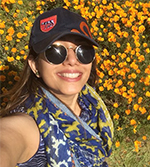 The Department of Humanities, Social Sciences, and the Arts welcomes Ambereen Dadabhoy as assistant professor of literature. She has held positions as a teaching assistant, graduate instructor and visiting assistant professor in the department. She earned her B.A. from California State University Long Beach and earned an M.A. and PhD in English literature from Claremont Graduate University. Much of her research considers the role of identity and difference in literature. She speaks Turkish and Urdu and reads Arabic. She is a member of the Modern Language Association, the Shakespeare Association of America and the Renaissance Society of America.
The Department of Humanities, Social Sciences, and the Arts welcomes Ambereen Dadabhoy as assistant professor of literature. She has held positions as a teaching assistant, graduate instructor and visiting assistant professor in the department. She earned her B.A. from California State University Long Beach and earned an M.A. and PhD in English literature from Claremont Graduate University. Much of her research considers the role of identity and difference in literature. She speaks Turkish and Urdu and reads Arabic. She is a member of the Modern Language Association, the Shakespeare Association of America and the Renaissance Society of America.
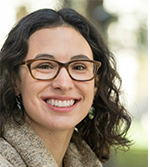 Leah Mendelson joins the Department of Engineering as an assistant professor. She earned her PhD in mechanical engineering from the Massachusetts Institute of Technology in May and holds an M.S. from MIT and a B.S. from the Franklin W. Olin College of Engineering. Her general research interests are biological and bioinspired fluid dynamics and imaging techniques for fluid flow measurement; her dissertation focused on how archer fish propel themselves out of the water to feed. She is a member of the American Physical Society and the Society for Integrative and Comparative Biology.
Leah Mendelson joins the Department of Engineering as an assistant professor. She earned her PhD in mechanical engineering from the Massachusetts Institute of Technology in May and holds an M.S. from MIT and a B.S. from the Franklin W. Olin College of Engineering. Her general research interests are biological and bioinspired fluid dynamics and imaging techniques for fluid flow measurement; her dissertation focused on how archer fish propel themselves out of the water to feed. She is a member of the American Physical Society and the Society for Integrative and Comparative Biology.
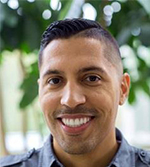 After earning his PhD in machine learning from Carnegie Mellon University this May, George Montañez will spend a year working at Microsoft, then will join the Harvey Mudd faculty in fall 2018. He holds an M.S. in computer science from Baylor University and a B.S. in computer science from the University of California Riverside. He was an NSF Graduate Research Fellow and a Ford Foundation Predoctoral Fellow. He twice served as an intern at Microsoft Research and once at Yahoo! Labs. He has worked as a software engineer and full-stack developer. His research lies at the intersection of computer science, algorithmic search and mathematics. At the 2017 International Joint Conference on Neural Networks, Montañez won the Best Poster award and the INNS/Intel Best Student Paper award for “The LICORS Cabinet: Nonparametric Light Cone Methods for Spatio-Temporal Modeling,” coauthored with Cosma Rohilla Shalizi. He previously won the Best Paper award at CIKM 2014, with coauthors Ryen White and Xiao Huang for their paper on cross-device search.
After earning his PhD in machine learning from Carnegie Mellon University this May, George Montañez will spend a year working at Microsoft, then will join the Harvey Mudd faculty in fall 2018. He holds an M.S. in computer science from Baylor University and a B.S. in computer science from the University of California Riverside. He was an NSF Graduate Research Fellow and a Ford Foundation Predoctoral Fellow. He twice served as an intern at Microsoft Research and once at Yahoo! Labs. He has worked as a software engineer and full-stack developer. His research lies at the intersection of computer science, algorithmic search and mathematics. At the 2017 International Joint Conference on Neural Networks, Montañez won the Best Poster award and the INNS/Intel Best Student Paper award for “The LICORS Cabinet: Nonparametric Light Cone Methods for Spatio-Temporal Modeling,” coauthored with Cosma Rohilla Shalizi. He previously won the Best Paper award at CIKM 2014, with coauthors Ryen White and Xiao Huang for their paper on cross-device search.
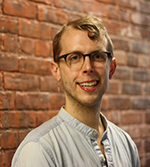 The Department of the Humanities, Social Sciences, and the Arts welcomes David Seitz as an assistant professor of human geography. Seitz comes from York University, where he was a visiting scholar in the Sexuality Studies Program within the Centre for Feminist Research. He earned his M.A. and PhD in human geography from the University of Toronto and his B.A. from Macalester College. As a cultural geographer interested in questions of citizenship, difference and affect, David’s research investigates how people form (or don’t form) community through space. His first book, A House of Prayer for All People: Contesting Citizenship in Queer Church, will be released in November with the University of Minnesota Press. The book investigates the emotional dynamics of intimacies and solidarities across race, gender and nation at a large, predominantly LGBTQ church in Toronto, Canada. An avid Star Trek fan, David’s next book project will examine how the franchise reflects the geographies of race, capitalism and colonialism.
The Department of the Humanities, Social Sciences, and the Arts welcomes David Seitz as an assistant professor of human geography. Seitz comes from York University, where he was a visiting scholar in the Sexuality Studies Program within the Centre for Feminist Research. He earned his M.A. and PhD in human geography from the University of Toronto and his B.A. from Macalester College. As a cultural geographer interested in questions of citizenship, difference and affect, David’s research investigates how people form (or don’t form) community through space. His first book, A House of Prayer for All People: Contesting Citizenship in Queer Church, will be released in November with the University of Minnesota Press. The book investigates the emotional dynamics of intimacies and solidarities across race, gender and nation at a large, predominantly LGBTQ church in Toronto, Canada. An avid Star Trek fan, David’s next book project will examine how the franchise reflects the geographies of race, capitalism and colonialism.
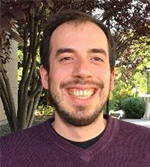 Brian Shuvé, hired last year, joins the Department of Physics as an assistant professor after deferring his appointment in order to do research at the SLAC National Accelerator Laboratory at Stanford. His PhD is from Harvard in theoretical particle physics, which, along with elementary particle physics, is his research specialty. He also holds a bachelor of applied science from the University of Toronto. Prior to SLAC, he was a postdoctoral researcher and lecturer at the Perimeter Institute for Theoretical Physics at the University of Waterloo. While at Harvard, he was a teaching consultant at the Derek Bok Center for Learning and Teaching and recipient of the White Prize for Excellence in Teaching.
Brian Shuvé, hired last year, joins the Department of Physics as an assistant professor after deferring his appointment in order to do research at the SLAC National Accelerator Laboratory at Stanford. His PhD is from Harvard in theoretical particle physics, which, along with elementary particle physics, is his research specialty. He also holds a bachelor of applied science from the University of Toronto. Prior to SLAC, he was a postdoctoral researcher and lecturer at the Perimeter Institute for Theoretical Physics at the University of Waterloo. While at Harvard, he was a teaching consultant at the Derek Bok Center for Learning and Teaching and recipient of the White Prize for Excellence in Teaching.
